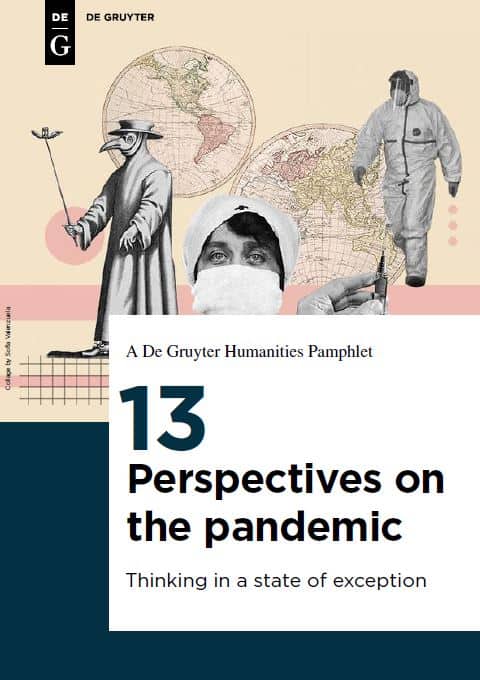Will Covid-19 Become Part of Collective Memory?
How has collective memory shaped our experience of the corona pandemic? And what will we remember about Covid-19 in the future? These are questions debated in the interdisciplinary field of memory studies.
This essay was first published in the free digital pamphlet 13 Perspectives on
the Pandemic: Thinking in a state of exception.
We could have seen it coming! More than two dozen epidemics and pandemics have washed over the globe in the past hundred years (SARS, MERS, the Swine Flu and HIV/AIDS among them). The worst pandemic was the Spanish Flu of 1918/1919, which killed, according to recent estimates, between 50 and 100 million people: more than World War One and World War Two put together.
But despite its centenary a couple of years ago, the Spanish Flu in Europe never belonged to what historian Reinhart Koselleck has called the “space of experience”. It is not part of collective memory: not widely commemorated, not talked about in school, not the focus of famous novels or iconic paintings. It therefore could not shape our “horizon of expectation”.
We could have seen it coming, but most people in Europe were utterly surprised by Covid-19 and the severe measures that had to be taken in March and April 2020 to control its spread. Our great-grandfathers, in 1918, had already lived through social distancing, makeshift field hospitals, the wearing of face masks, and even ghost football games. But these experiences remained unremembered.
Collective Memory in the Corona Crisis
But what is currently remembered? Which collective memories are triggered, and used to frame the pandemic? It seems that Cold War patterns of thought (rumors about biowarfare), racial stereotypes (attacks on Asian-looking people, resurging antisemitism), and national memories of World War Two (Trump comparing Covid-19 with Pearl Harbor) are revived. In many countries, the lockdowns bring back memories of curfews under dictatorships.
“In many countries, the lockdowns bring back memories of curfews under dictatorships.”
On a lighter note: people start rereading books about past pandemics, from Boccaccio’s Decameron (ca. 1349–53) to Camus’ La Peste (1947). In this way, the Spanish Flu, too, was transformed from a remnant in the dusty archive to an active, widespread and vibrant memory. Books like Laura Spinney’s magisterial global history of the Spanish Flu (Pale Rider, 2018) are suddenly sold out.
Future Memories of Covid-19
If pandemics did not play a great role in past collective memory, how will the world remember the present corona crisis in the future? Of course, nobody knows, and everything I am writing now is pure conjecture before the historical events themselves have even come to a close.
But a few things are noteworthy: Covid-19 is the first global pandemic of the digital age. In terms of archives (including worldwide digital information about case numbers and the circulation of personal experiences via social media) there will be an abundance of sources for future collective memory.
Much of collective memory depends on top-down processes: will nation states or the EU “invest” in memories of the corona pandemic? Will they set up memorial ceremonies, commemoration days, even museums? Will the pandemic become a part of history textbooks? This will likely be the case in countries that have been hit particularly hard by it. But the problem of remembering health crises and natural catastrophes is that the role of human agency in them is less clearly discernible than, say, in wars, genocides, and terrorist attacks. It is therefore more difficult to draw normative lessons from pandemics: who is responsible for Covid-19? What is the ‘never again’?
A Corona Generation?
But there are also bottom-up processes of collective memory. One is generational remembering. The corona pandemic has all the ingredients of a generation-defining experience. For those young people who are now in what the sociologist Karl Mannheim has called their “formative years” (ca. 17–24) the current lockdowns mean both extended (considering that time flows more slowly when you are young) and fundamental changes: school, university, socializing and, yes, dating, as well as rites of passage (from graduation parties to stays abroad) are not what they used to be.
At the same time, this generation is witness to both acute global risk and an unprecedented degree of planetary connectedness. This is an incisive experience. Events of adolescence and early adulthood are remembered best across the lifespan. They also tend to shape a person’s political ideas. Covid-19 might become connected in young people’s memories with the recent Fridays for Future-movement. If so, generational memory might retain a sense of being existentially entangled in a global dynamic of climate change, species extinction, and pandemics — and the need for collective action.
But this is a hopeful scenario. The memory of the corona crisis could also become entirely blocked out or overwritten by ensuing economic or political crises. And of course, collective memory will take shape differently, depending on whether the pandemic was experienced in places with few or many corona victims, in autocratic regimes, in failing or successful democracies, from the top or the bottom of global society.
Learn more in this related title from De Gruyter
[Title image via Wikimedia Commons/Public Domain]
